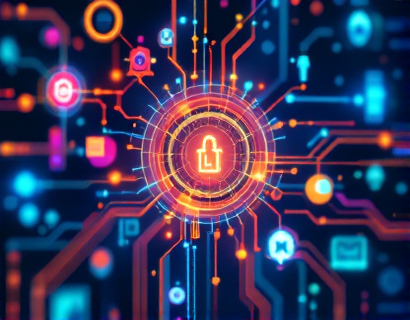Unlocking the Future: Harnessing AI and Crypto for Next-Gen Financial Transformation
The intersection of artificial intelligence and cryptocurrency is paving the way for a revolutionary transformation in the financial sector. This synergy is not just a technological curiosity but a powerful force that is reshaping how we perceive, interact with, and utilize financial systems. As we stand on the brink of a new era, understanding the potential and implications of combining these two advanced technologies is crucial for tech enthusiasts, innovators, and anyone interested in the future of finance.
The integration of AI and crypto is multifaceted, impacting various aspects of financial services from security and efficiency to accessibility and innovation. This article delves into the transformative power of this combination, exploring how it enhances digital experiences and opens new avenues for growth and development in the financial landscape.
Enhancing Security with AI and Crypto
One of the most significant benefits of merging AI with cryptocurrency is the enhancement of security measures. Traditional financial systems often struggle with fraud, hacking, and unauthorized access, leading to substantial financial losses and erosion of trust. AI, with its advanced analytics and machine learning capabilities, can detect and prevent fraudulent activities with unprecedented accuracy.
In the crypto space, AI algorithms can monitor transactions in real-time, identifying patterns and anomalies that indicate potential security breaches. These systems can adapt and learn from new data, continuously improving their ability to safeguard user assets. Smart contracts, a cornerstone of blockchain technology, can also be enhanced with AI to automate and enforce contractual obligations more securely and efficiently.
Moreover, AI-driven security solutions can provide users with personalized risk assessments and recommendations, tailoring security measures to individual needs. This level of customization ensures that users are not only protected but also empowered to manage their own security effectively.
Improving Efficiency and Reducing Costs
The financial industry is notorious for its bureaucratic processes and high operational costs. AI and crypto have the potential to streamline operations, reduce costs, and increase efficiency across the board. By automating routine tasks and eliminating intermediaries, these technologies can significantly lower transaction fees and processing times.
For instance, AI-powered chatbots and virtual assistants can handle customer inquiries and support tasks, reducing the need for extensive human resources. Blockchain technology, inherently designed to be decentralized, combined with AI, can further optimize these processes by ensuring transparency and reducing the need for manual verification.
Smart contracts, executed automatically when predefined conditions are met, can simplify complex financial agreements and transactions. This not only speeds up the process but also minimizes the risk of human error and fraud. The result is a more efficient, cost-effective, and reliable financial system that benefits both institutions and individual users.
Enhancing Accessibility and Inclusion
Access to financial services is a critical issue worldwide, with millions of people lacking basic banking facilities and financial inclusion. The combination of AI and crypto offers a promising solution to this challenge. Decentralized finance (DeFi) platforms, powered by blockchain and AI, can provide financial services to underserved populations without the need for traditional banking infrastructure.
AI can play a crucial role in making these platforms more user-friendly and accessible. Natural language processing (NLP) technologies can translate complex financial concepts into simple, understandable language, breaking down barriers for those unfamiliar with financial jargon. Additionally, AI-driven identity verification systems can facilitate secure and quick onboarding processes, making it easier for individuals to access financial services.
Crypto assets, being digital and easily transferable, can serve as a store of value and medium of exchange for those excluded from the traditional banking system. This democratization of finance has the potential to drive economic growth and reduce inequality on a global scale.
Innovating Financial Products and Services
The synergy between AI and crypto is also fostering innovation in financial products and services. Traditional financial instruments such as loans, insurance, and investment products are being reimagined in the crypto space, offering new features and benefits.
AI-driven credit scoring models can assess creditworthiness based on a broader range of data points, including online behavior and social media activity. This allows for more accurate and fair credit assessments, opening up financial opportunities for individuals who might have been overlooked by traditional systems.
Crypto-based investment platforms can leverage AI to provide personalized portfolio management and trading advice. These platforms can analyze market trends, predict price movements, and execute trades with high precision, offering investors better returns and reduced risk. The transparency and immutability of blockchain ensure that all transactions are recorded and verifiable, enhancing trust and reliability.
Furthermore, AI can facilitate the creation of new financial products, such as tokenized assets and security tokens, which represent real-world assets or equity in a digital format. These tokens can be traded on decentralized exchanges, providing liquidity and accessibility to a wider audience.
Transforming Payment Systems
Payment systems are undergoing a radical transformation with the integration of AI and crypto. Traditional payment methods are often slow, expensive, and limited by geographical boundaries. Crypto transactions, facilitated by AI, can offer faster, cheaper, and more global payment solutions.
AI-powered payment networks can optimize transaction routes and processing times, ensuring that funds are transferred quickly and securely. Cross-border payments, in particular, benefit from this technology, as they can bypass traditional banking systems and their associated delays and fees.
Moreover, AI can enhance the user experience by providing real-time transaction tracking, fraud detection, and personalized payment options. For example, AI can suggest the most cost-effective payment methods based on the user's preferences and transaction history, making the payment process more efficient and user-friendly.
Challenges and Considerations
While the potential of AI and crypto in finance is immense, it is essential to acknowledge the challenges and considerations that come with this transformation. Regulatory frameworks are still evolving, and the lack of clear guidelines can pose risks for both users and developers. Ensuring compliance with existing laws and regulations while innovating is a delicate balance that requires careful navigation.
Another significant challenge is the scalability of blockchain networks. As the number of transactions increases, the performance and efficiency of these networks can be strained. AI can help address this issue by optimizing network operations and developing more efficient consensus mechanisms.
Privacy concerns are also paramount. While blockchain's transparency is a strength, it can also expose sensitive information. AI can be used to develop advanced encryption and anonymization techniques, ensuring that user data remains secure and private.
The Road Ahead
The future of finance is undeniably intertwined with AI and crypto. As these technologies continue to mature and gain widespread adoption, we can expect even more innovative applications and transformative changes. The key to harnessing this potential lies in collaboration between technologists, regulators, and industry stakeholders.
Continued research and development are essential to overcome current limitations and unlock new possibilities. Education and awareness campaigns can help demystify these technologies, fostering greater acceptance and adoption among the general public. By embracing this digital revolution, we can create a more secure, efficient, and inclusive financial landscape for all.
In conclusion, the combination of AI and crypto is not just a technological trend but a fundamental shift in how we approach finance. It offers a pathway to a future where financial services are more secure, efficient, accessible, and innovative. As we navigate this exciting frontier, the possibilities are endless, and the future looks brighter than ever.










































